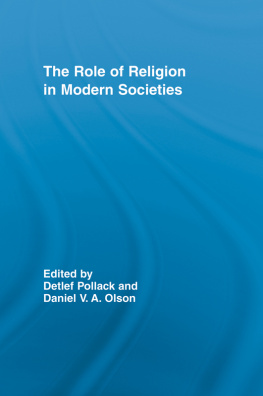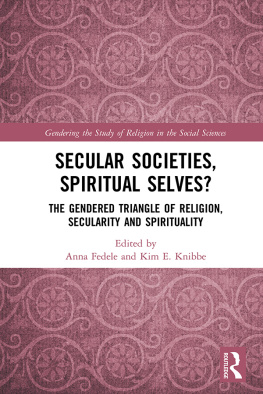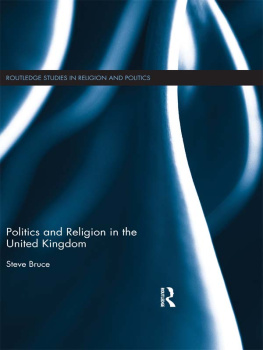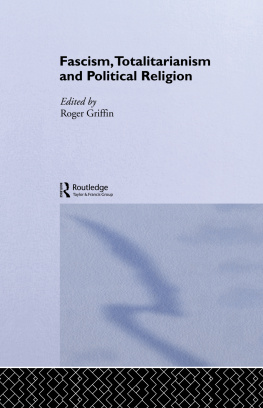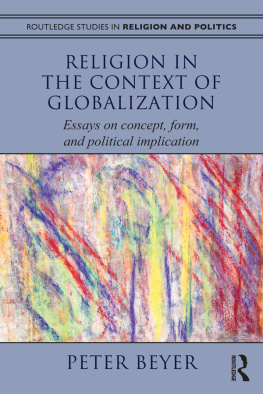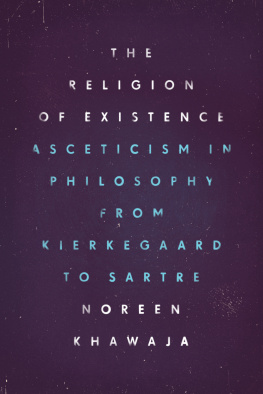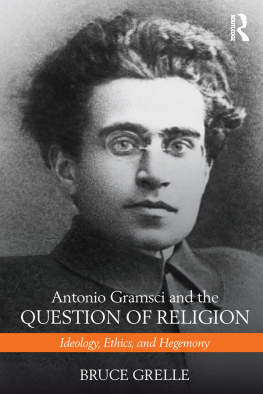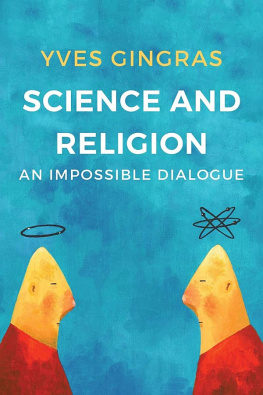The Role of Religion
in Modern Societies
Routledge Advances in Sociology
1. Virtual Globalization
Virtual Spaces / Tourist Spaces
Edited by David Holmes
2. The Criminal Spectre in Law, Literature and Aesthetics
Peter Hutchings
3. Immigrants and National Identity in Europe
Anna Triandafyllidou
4. Constructing Risk and Safety in Technological Practice
Edited by Jane Summerton and Boel Berner
5. Europeanisation, National Identities and Migration
Changes in Boundary Constructions
Between Western and Eastern Europe
Willfried Spohn and Anna Triandafyllidou
6. Language, Identity and Conflict
A Comparative Study of Language in
Ethnic Conflict in Europe and Eurasia
Diarmait Mac Giolla Chrost
7. Immigrant Life in the U.S.
Multi-disciplinary Perspectives
Edited by Donna R. Gabaccia and Colin
Wayne Leach
8. Rave Culture and Religion
Edited by Graham St. John
9. Creation and Returns of Social Capital
A New Research Program
Edited by Henk Flap and Beate Vlker
10. Self-Care
Embodiment, Personal Autonomy and the
Shaping of Health Consciousness
Christopher Ziguras
11. Mechanisms of Cooperation
Werner Raub and Jeroen Weesie
12. After the Bell Educational Success, Public Policy and Family Background
Edited by Dalton Conley and Karen Albright
13. Youth Crime and Youth Culture in the Inner City
Bill Sanders
14. Emotions and Social Movements
Edited by Helena Flam and Debra King
15. Globalization, Uncertainty and Youth in Society
Edited by Hans-Peter Blossfeld, Erik Klijzing, Melinda Mills and Karin Kurz
16. Love, Heterosexuality and Society
Paul Johnson
17. Agricultural Governance
Globalization and the New Politics of Regulation
Edited by Vaughan Higgins and Geoffrey Lawrence
18. Challenging Hegemonic Masculinity
Richard Howson
19. Social Isolation in Modern Society
Roelof Hortulanus, Anja Machielse and Ludwien Meeuwesen
20. Weber and the Persistence of Religion
Social Theory, Capitalism and the Sublime
Joseph W. H. Lough
21. Globalization, Uncertainty and Late Careers in Society
Edited by Hans-Peter Blossfeld, Sandra
Buchholz and Dirk Hofcker
22. Bourdieus Politics
Problems and Possibilities
Jeremy F. Lane
23. Media Bias in Reporting Social Research?
The Case of Reviewing Ethnic Inequalities in Education
Martyn Hammersley
24. A General Theory of Emotions and Social Life
Warren D. TenHouten
25. Sociology, Religion and Grace
Arpad Szakolczai
26. Youth Cultures
Scenes, Subcultures and Tribes
Edited by Paul Hodkinson and Wolfgang Deicke
27. The Obituary as Collective Memory
Bridget Fowler
28. Tocquevilles Virus
Utopia and Dystopia in Western Social and Political Thought
Mark Featherstone
29. Jewish Eating and Identity Through the Ages
David Kraemer
30. The Institutionalization of Social Welfare
A Study of Medicalizing Management
Mikael Holmqvist
31. The Role of Religion in Modern Societies
Edited by Detlef Pollack and Daniel V. A. Olson
The Role of Religion
in Modern Societies
Edited by
Detlef Pollack and
Daniel V. A. Olson

Routledge
Taylor & Francis Group
711 Third Avenue, New York, NY 10017
Routledge
Taylor & Francis Group
2 Park Square
Milton Park, Abingdon
Oxon OX14 4RN
2008 by Taylor & Francis Group, LLC
Routledge is an imprint of Taylor & Francis Group, an Informa business
First issued in paperback 2011
No part of this book may be reprinted, reproduced, transmitted, or utilized in any form by any electronic, mechanical, or other means, now known or hereafter invented, including photocopying, microfilming, and recording, or in any information storage or retrieval system, without written permission from the publishers.
Trademark Notice: Product or corporate names may be trademarks or registered trademarks, and are used only for ident ification and explanation without intent to infringe.
| Library of Congress Cataloging-in-Publication Data |
| The role of religion in modern societies I edited by Detlef Pollack and Daniel Olson. |
| p. em. -- (Routledge advances in sociology; 31) |
| Includes bibliographical references and index. |
| ISBN 978-0-415-39704-9 (hardback: alk. paper) |
| 1. Religion and sociology. I. Pollack, Detlef, 1955- II. Olson, Daniel V. A., 1953- |
| BL60.R66 2007 |
| 306.6--dc22 2007002567 |
Visit the Taylor & Francis Web site at
www.taylorandfrancis.com
and the Routledge Web site at
www.routledge.com
ISBN13: 978-0-415-39704-9 (hbk)
ISBN13: 978-0-415-51253-4 (pbk)
Contents
DETLEF POLLACK
SECTION 1
Secularization Theory: Classical Assumptions and Ramifications
DAVID VOAS
STEVE BRUCE
OLAF MLLER
SECTION 2
The Market Model: Classical Assumptions and Ramifications
DANIEL V.A. OLSON
ANTHONY GILL
ANDREW GREELEY
SECTION 3
The Individualization Thesis: Classical Assumptions and Ramifications
GRACE DAVIE
ROBIN GILL
DETLEF POLLACK AND GERT PICKEL
SECTION 4
New Theories on Religion and Modernity Exemplified at the European Case
MONIKA WOHLRAB-SAHR
JRG STOLZ
Tables
Figures
Preface
Religion is back on the political agenda of western societies that, for the most part, have come to regard themselves as secularized. Today, the mass media closely follow religious events and developments as never before during recent decades. Politicians are concerned about the political consequences of religious conflicts. Historians, sociologists, and political scientists attempt to explain why religion still influences the thinking and behavior of many people to such a high degree. It was not only the events of September 11, 2001, that sharpened our sensitivity towards the social and political relevance of religious orientations and affiliations. It was also the religious charging of ethnic and national conflicts all over the world, as well as the social and political problems in many western countries that arose from the tendency towards increasing religious heterogeneity in these societies that have long been important points of concern. Due to the unprecedented degree of public visibility and political relevance of religion, the number of social scientists who criticize the secularization thesis and question the generally assumed correlation between modernization and secularization is growing. Religion, they claim, does not decline under the conditions of modernity, but rather gains in strength. Religion and modernity are furthermore not marked by a tense relationship, as the proponents of the secularization theory assume, but rather compatible with one another. In their view, religion can even function as a source of modernization.
Postulations like these challenge many basic assumptions within the social sciences, which from their very beginnings have treated religion and modernity as contradictory. As supported by the sociological classics such as Emile Durkheim, Max Weber, Georg Simmel, Ferdinand Tnnies, and others, many social scientists today still propose to interpret the relationship between religion and modernity as one riddled with tension. It is therefore not surprising that fierce dispute has erupted between the proponents of the secularization theory and its challengers over how to adequately interpret the processes of religious change in modern societies. Critics of the secularization theory have mostly rallied around the economic market model, which evolved within the North American sociology of religion. Thus, the argument over the social position of religion under conditions of modernity, and explanations of change therein, is to a large extent an argument between European and American sociologists of religion. This discrepancy in assessment is partly due to differing degrees in the social relevance of religion in the United States and in most European countries. While the social significance of religion and church in many European countries is declining, in the United States religion is publicly visible, fulfills a wide spectrum of social and political functions, and is accepted by many individuals as a guideline for their thoughts and behaviors. It would, however, neither be appropriate to attribute the cognitive differences between European and American sociologists of religion merely to differences in their religious environments, nor would it be convincing to deduce their differing views from their personal religious convictions. Behind their disagreements concerning the role of religion in modern societies lie decisive conceptual differences. Secularization theorists regard religion mostly as a set of traditions, which is increasingly forfeiting its social binding capacity due to rapid societal change. The economic market model regards religion more as a flexible and prolific element of social life that enables self-organization as well as social and political mobilization. In the first model, modern principles such as functional differentiation, the separation between church and state, industrialization, urbanization, higher living standards, pluralism, and individualism have a negative effect on the level of religiosity. In the second, the effects of these principles are in contrast positive. In the first model, emphasis is placed on demands for religion, which are seen to be on the decline, while the second model stresses religious offersassociations, organizations, and institutions that provide religious services. The latter does not include individual religious demands in its analysis, as this factor is regarded as stable and more or less unchanging. The dispute between these two positions is quite entrenched and seems to have deepened rather than relaxed in recent times due to the polemical nature of argumentation between the proponents of both sides (such as Steve Bruce and Rodney Stark, to name only two of the most prominent opponents).
Next page
